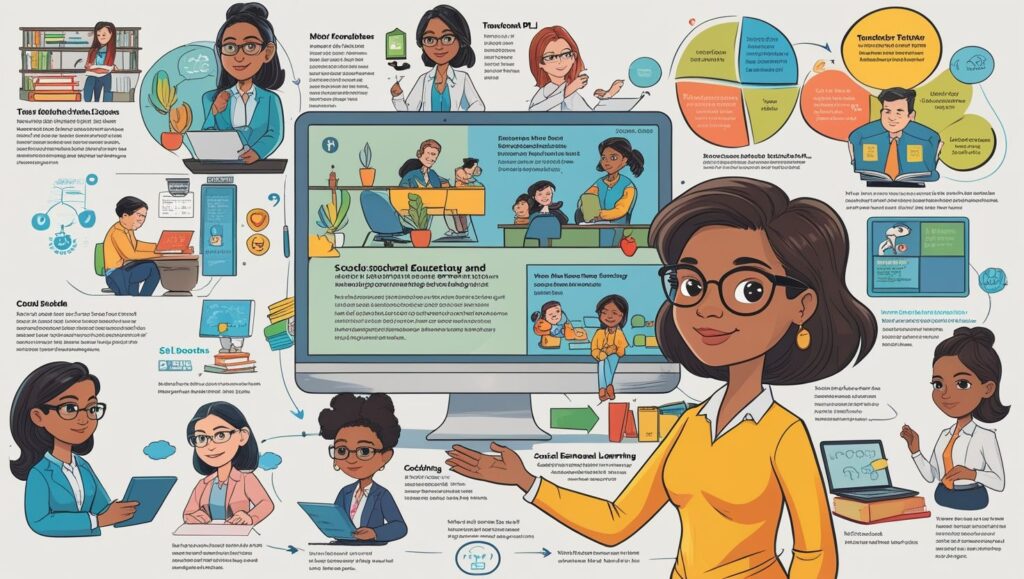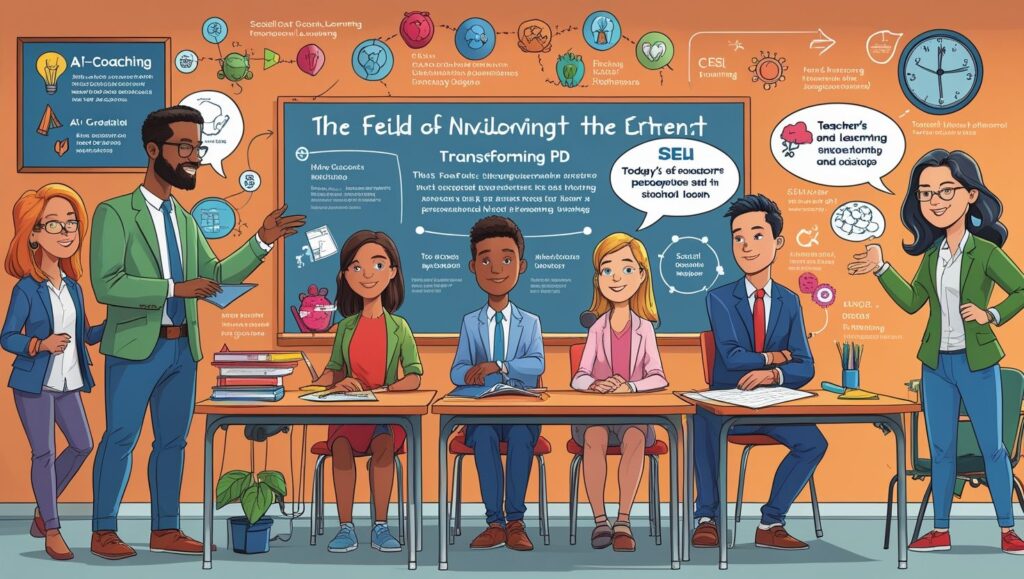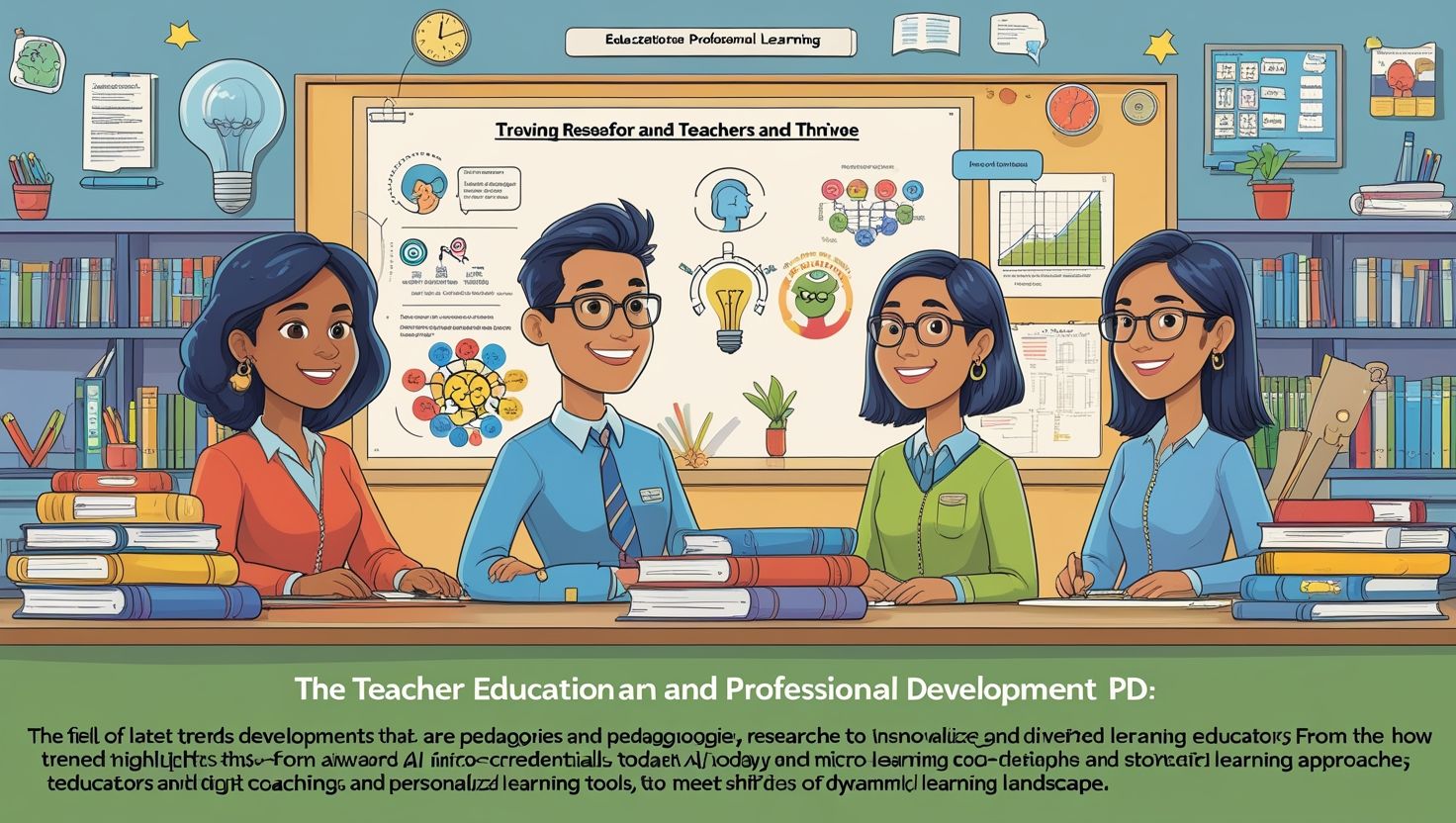Introduction:
Top Trends in Teacher Education and PD, The field of teacher education and professional development (PD) is evolving rapidly, driven by technology, research, and shifting educational demands. Today’s educators must adapt to innovative pedagogies, digital tools, and personalized learning approaches to meet diverse student needs. From AI-powered coaching to micro-credentials and social-emotional learning (SEL) training, the latest trends are reshaping how teachers grow and thrive. This exploration highlights key developments that are transforming PD—ensuring educators stay ahead in a dynamic learning landscape.
1. Artificial Intelligence & AI Literacy
AI is revolutionizing education—teachers are now engaging with AI-powered tools for personalized learning, lesson planning, administrative support, and providing tailored student feedback. Federal and industry efforts, including an AFT‑backed AI training hub funded by Microsoft, OpenAI, and Anthropic, are increasing teacher readiness and competence in this domain.

2. Social-Emotional Learning (SEL) & Teacher Well‑being
SEL continues to be central in teacher training as schools prioritize student mental health, emotional resilience, and interpersonal skills. Additionally, educator well‑being—stress management, self‑care, and work-life balance—is now a key area of professional development.
3. Diversity, Equity & Inclusion (DEI)
Training in culturally responsive teaching, trauma-informed practices, and equity-based instruction is now considered foundational rather than supplementary. DEI-focused PD helps teachers foster inclusive learning environments and address systemic biases.
4. Coaching & Mentorship Models
Instructional coaching, mentoring software platforms, and mentorship-based programs like urban teacher residencies are increasingly used to support reflective and sustained teacher growth. Scalable mentoring has been shown to significantly improve retention and instructional quality.
5. Data Literacy & Learning Analytics
Educators are learning to leverage student performance data, educational data mining, and analytics to inform instruction, design assessments, and make equitable decisions. PD increasingly covers how to interpret and apply this data in meaningful ways.

6. Hybrid, Blended & Active Learning Models
Blended learning designs—like flipped classrooms and active learning strategies—are redefining instruction. Teachers are adapting to flexible, technology-enabled pedagogy that fosters engagement and collaboration, both in-person and online.
7. Immersive & Assistive Technologies (XR, VR, Robotics)
Virtual and augmented reality (VR/AR), classroom robots, and assistive technologies are gaining ground—especially to foster experiential learning and support students with diverse needs. Pre‑service use of VR in teacher training is expanding, though infrastructure remains a challenge.
8. Emerging & Supporting Areas
- Neuroeducation: Insights from neuroscience are increasingly informing pedagogical strategies in 2025, promoting brain‑based teaching practices.
- Teacher Retention Studies: Research on attrition factors—especially in high‑needs areas and among educators of color—is shaping policy and PD designs to improve retention.
- Learning Ecosystems & Regional Collaboration: Partnerships between schools, communities, and industries are creating integrated learning systems that enhance teacher PD and local capacity building.
9. Why These Trends Matter
These areas reflect the current priorities in U.S. teacher education:
- Leveraging technology responsibly (AI, data, XR)
- Building inclusive, equitable classrooms
- Supporting teacher growth and retention through coaching and peer networks
- Promoting holistic wellness for educators and students alike
Conclusion:
In conclusion, the evolving landscape of teacher education in the U.S. highlights a strong shift toward innovation, inclusivity, and well-being. With the rise of artificial intelligence, data literacy, and immersive technologies, educators are being equipped with tools that transform traditional instruction into dynamic, student-centered learning. At the same time, the focus on social-emotional learning, diversity, and mental health ensures that both teachers and students thrive in a supportive environment. Coaching, mentorship, and collaborative learning communities play an essential role in continuous professional growth. Moreover, these trends are not isolated—they are interconnected and aligned with the broader goal of preparing educators for the complex demands of modern classrooms. As these developments continue to shape policies and practices, it becomes increasingly important for teacher preparation programs to stay adaptable and forward-thinking. Ultimately, investing in these trends today helps build a stronger, more resilient, and future-ready education system for all.

Üsküdar su kaçak tespiti 2025 Güler yüzlü hizmet ve profesyonel bir yaklaşım. Su kaçağı sorunum çözüldü. https://nextforbes.com/uskudar-su-kacagi-tespiti-hizli-ve-guvenilir-cozumler/
Üsküdar su kaçak tespiti 2025 Üsküdar su kaçağı tespiti ekibimizle kırmadan, dökmeden su sızıntılarını tespit ediyoruz. Profesyonel hizmet garantisi. https://meedpub.com/uskudar-su-kacak-tespiti-2025/
Why visitors still use to read news papers when in this
technological world the whole thing is existing on net? https://Fortune-Glassi.Mystrikingly.com/